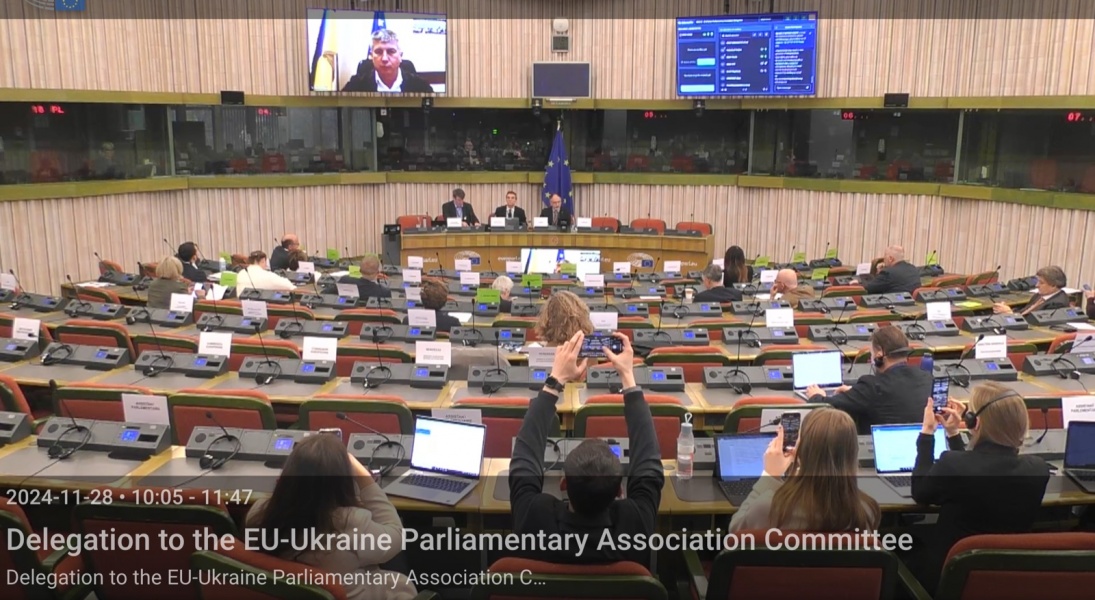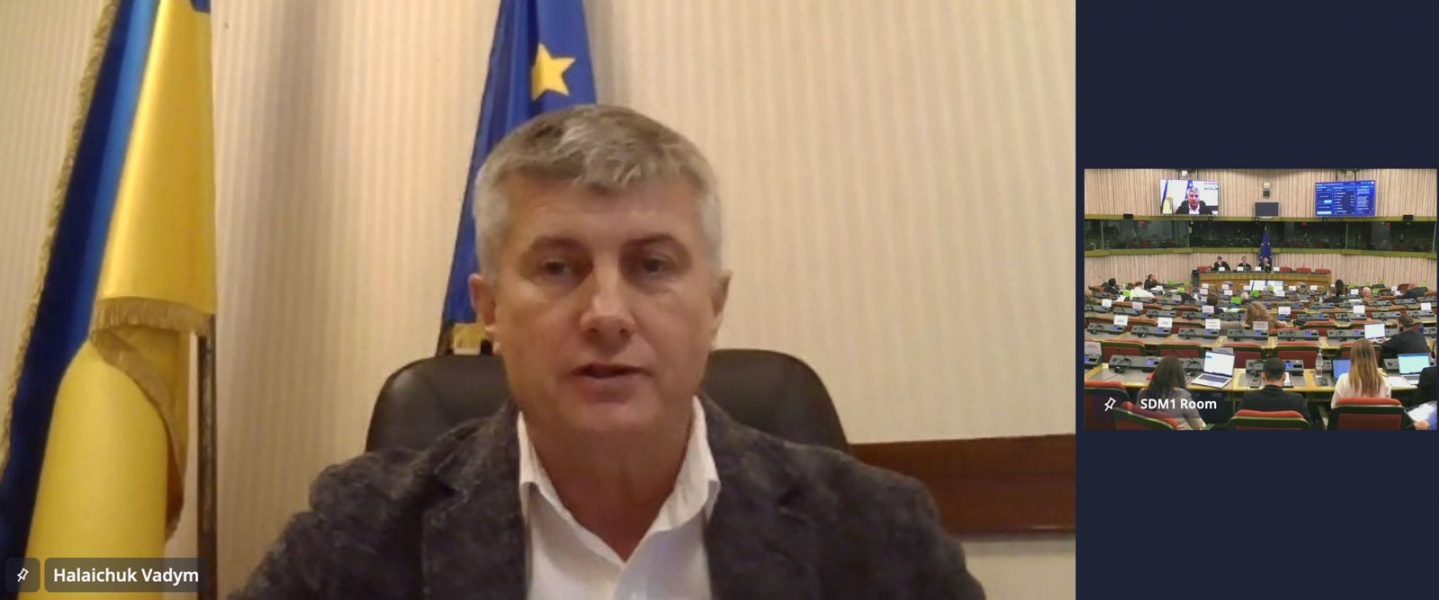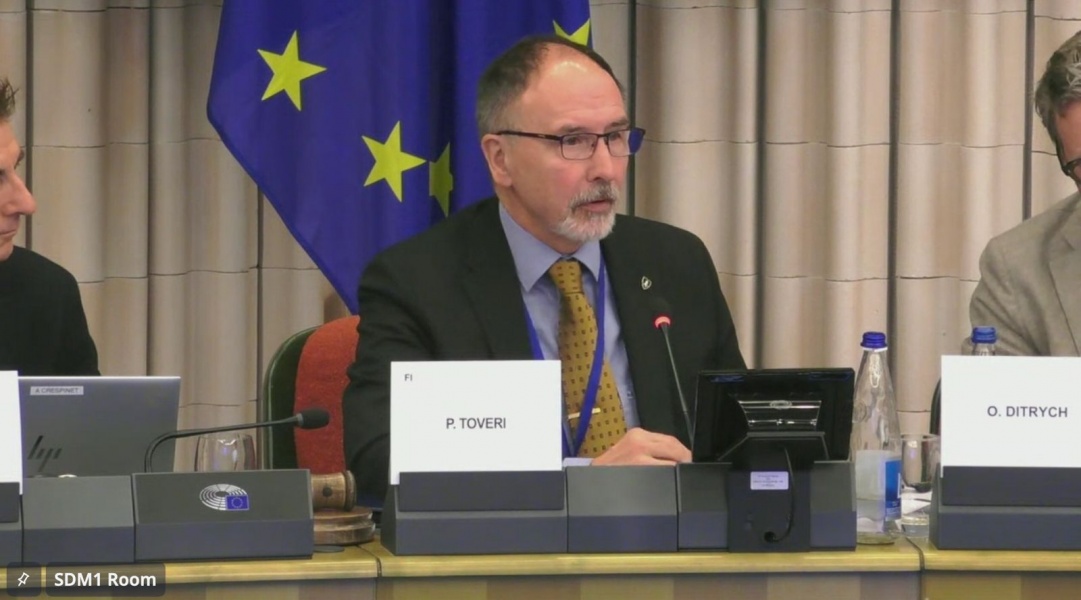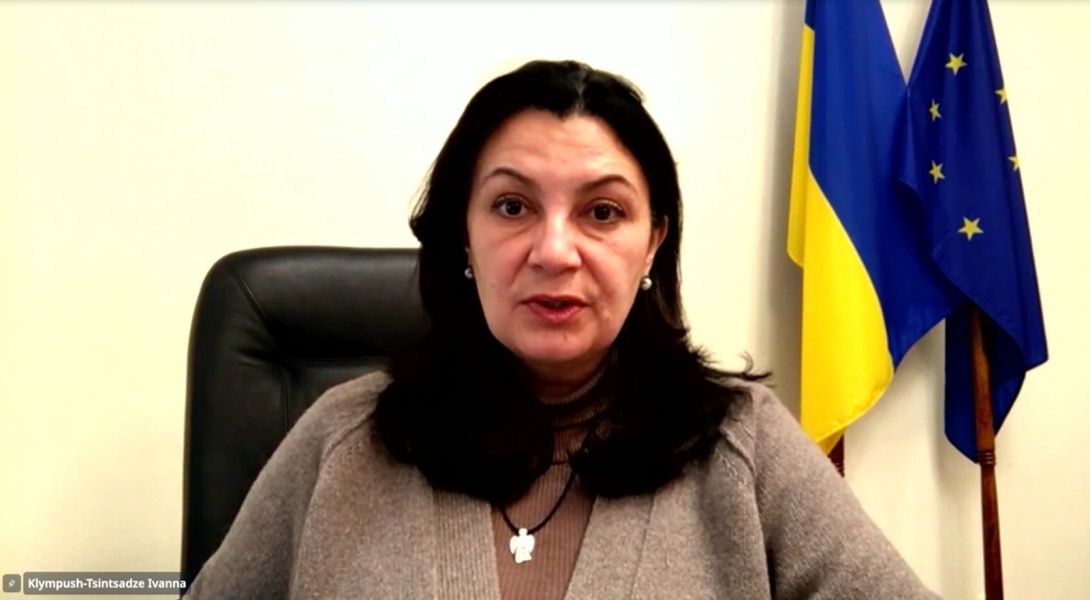
The Co-Chair of the Ukraine-EU Parliamentary Association Committee from the Ukrainian side, Vadym Halaichuk, and the First Deputy Co-Chair, Ivanna Klympush-Tsintsadze, participated in the meeting of the European part of the PAC, which took place in the European Parliament.
Vadym Halaichuk stressed that Russian attacks occur every day and every night with a record number of missiles and drones targeting civilian infrastructure. These attacks aim to destroy the energy infrastructure, cause chaos, and potentially trigger a new wave of immigration from Ukraine. Moreover, they seek to break the will of the Ukrainian people. “I want to take this opportunity to call on you to strengthen Ukraine’s air defence, to provide the defence systems we requested, that were ultimately promised to us but have not been delivered yet. It is crucial to reach a joint decision on protecting the Ukrainian sky,” said Vadym Halaichuk. “I call on the Representation in the Ukraine-EU Parliamentary Association Committee to seriously consider steps for Ukraine’s protection. NATO representatives must be involved in this discussion to find a common solution for protecting Ukraine’s airspace, at least near the border. As you know, there have been cases where drones launched by Russia flew into the territory of Poland and Romania. This is a very serious reason for concern,” emphasised Vadym Halaichuk.

Regarding financial assistance, Vadym Halaichuk welcomed decisions on its increase in case of support reduction by the United States. Discussions are already underway about increasing funding from the European Union, its individual members, and through joint defence projects. “We must use this platform to convey to our American colleagues that this is not merely a Russian-Ukrainian issue. Russia is attacking Europe and the European Union. This is our common position. And when we together — Ukraine and the EU — express this common view — our voices sound much stronger,” said Vadym Halaichuk. He also noted that Ukraine is impressed by the perspective of the newly elected US administration that lasting peace must be achieved from a position of strength.

Regarding European integration, the co-chair of the Ukraine-EU Parliamentary Association Committee from the Ukrainian side noted that the Verkhovna Rada participates in the negotiation process through negotiation groups, which are involved in the screening of Ukrainian legislation. He noted that Ukraine anticipates opening negotiations on the “Fundamentals” cluster at the beginning of 2025. Regarding Euro-Atlantic integration, Vadym Halaichuk stressed that NATO membership remains Ukraine's strategic goal and is part of Ukraine's peace plan. Ukraine needs a clear message regarding its membership prospects, which cannot be the subject of any bargaining with Russia. Vadym Halaichuk considers the bilateral security agreements, concluded with more than two dozen countries, a transitional phase toward NATO membership. These agreements should ensure both assistance to Ukraine and its movement towards the Alliance.
Vadym Halaichuk also stressed the need to combat Russian propaganda, which exploits any tools available, particularly during European elections. According to him, Russia spreads lies that, unfortunately, achieve their goal and imbed Russian narratives on European soil. “We must confront this together”, asserted Vadym Halaichuk. He thanked the European partners for their long-term and dedicated support and invited them to visit Ukraine soon to plan further joint work.
Ivanna Klympush-Tsintsadze, First Deputy Co-Chair of the EU-Ukraine Parliamentary Association Committee emphasised that the Russian Federation has significantly intensified attacks on Ukraine, in particular on civilian infrastructure. If it manages to achieve its goal of destroying Ukrainian energy infrastructure, this could trigger a new large wave of refugees from Ukraine seeking shelter in EU countries. To prevent this, Ukraine, according to Ivanna Klympush-Tsintsadze, needs increased military assistance. Another large-scale consequence of these attacks is the severe damage to Ukraine's economy. “If we cannot protect our energy infrastructure, we will suffer large daily losses in our economy. This means less budget revenues and limiting defence funding. This requires an honest conversation with our partners. We may even need to reallocate part of the assistance we received for social purposes to defence,” said Ivanna Klympush-Tsintsadze.

Regarding bilateral guarantees of support for Ukraine, she emphasised that they are important promises but not a guarantee of Ukraine’s security. “The only true guarantee of security and a guarantee of long-term, sustainable peace, is Ukraine’s NATO membership. We should not take this opportunity off the table, even if some consider it unlikely. As for other guarantees, the direct military presence of allies in Ukraine and military bases in Ukraine could also serve as a guarantee, if not NATO membership. But it seems that our Western partners have even less appetite for this than for Ukraine’s membership in the Alliance,” said the First Deputy Co-Chair of the Ukraine-EU Parliamentary Association Committee.
Addressing public sentiment, Ivanna Klympush-Tsintsadze noted that over the past six months, opinion polls demonstrated an increase in the number of those who support negotiations with Russia. However, these polls don’t account for the opinions of the military who directly defend Ukraine. At the same time, the vast majority of society understands that to preserve sovereignty, it is necessary to change the situation on the front lines with the help of partners, to be able speak about the possibility of any negotiations from a strong position, emphasised Ivanna Klympush-Tsintsadze.
Vadym Halaichuk stressed that Russian attacks occur every day and every night with a record number of missiles and drones targeting civilian infrastructure. These attacks aim to destroy the energy infrastructure, cause chaos, and potentially trigger a new wave of immigration from Ukraine. Moreover, they seek to break the will of the Ukrainian people. “I want to take this opportunity to call on you to strengthen Ukraine’s air defence, to provide the defence systems we requested, that were ultimately promised to us but have not been delivered yet. It is crucial to reach a joint decision on protecting the Ukrainian sky,” said Vadym Halaichuk. “I call on the Representation in the Ukraine-EU Parliamentary Association Committee to seriously consider steps for Ukraine’s protection. NATO representatives must be involved in this discussion to find a common solution for protecting Ukraine’s airspace, at least near the border. As you know, there have been cases where drones launched by Russia flew into the territory of Poland and Romania. This is a very serious reason for concern,” emphasised Vadym Halaichuk.

Regarding financial assistance, Vadym Halaichuk welcomed decisions on its increase in case of support reduction by the United States. Discussions are already underway about increasing funding from the European Union, its individual members, and through joint defence projects. “We must use this platform to convey to our American colleagues that this is not merely a Russian-Ukrainian issue. Russia is attacking Europe and the European Union. This is our common position. And when we together — Ukraine and the EU — express this common view — our voices sound much stronger,” said Vadym Halaichuk. He also noted that Ukraine is impressed by the perspective of the newly elected US administration that lasting peace must be achieved from a position of strength.

Regarding European integration, the co-chair of the Ukraine-EU Parliamentary Association Committee from the Ukrainian side noted that the Verkhovna Rada participates in the negotiation process through negotiation groups, which are involved in the screening of Ukrainian legislation. He noted that Ukraine anticipates opening negotiations on the “Fundamentals” cluster at the beginning of 2025. Regarding Euro-Atlantic integration, Vadym Halaichuk stressed that NATO membership remains Ukraine's strategic goal and is part of Ukraine's peace plan. Ukraine needs a clear message regarding its membership prospects, which cannot be the subject of any bargaining with Russia. Vadym Halaichuk considers the bilateral security agreements, concluded with more than two dozen countries, a transitional phase toward NATO membership. These agreements should ensure both assistance to Ukraine and its movement towards the Alliance.
Vadym Halaichuk also stressed the need to combat Russian propaganda, which exploits any tools available, particularly during European elections. According to him, Russia spreads lies that, unfortunately, achieve their goal and imbed Russian narratives on European soil. “We must confront this together”, asserted Vadym Halaichuk. He thanked the European partners for their long-term and dedicated support and invited them to visit Ukraine soon to plan further joint work.
Ivanna Klympush-Tsintsadze, First Deputy Co-Chair of the EU-Ukraine Parliamentary Association Committee emphasised that the Russian Federation has significantly intensified attacks on Ukraine, in particular on civilian infrastructure. If it manages to achieve its goal of destroying Ukrainian energy infrastructure, this could trigger a new large wave of refugees from Ukraine seeking shelter in EU countries. To prevent this, Ukraine, according to Ivanna Klympush-Tsintsadze, needs increased military assistance. Another large-scale consequence of these attacks is the severe damage to Ukraine's economy. “If we cannot protect our energy infrastructure, we will suffer large daily losses in our economy. This means less budget revenues and limiting defence funding. This requires an honest conversation with our partners. We may even need to reallocate part of the assistance we received for social purposes to defence,” said Ivanna Klympush-Tsintsadze.

Regarding bilateral guarantees of support for Ukraine, she emphasised that they are important promises but not a guarantee of Ukraine’s security. “The only true guarantee of security and a guarantee of long-term, sustainable peace, is Ukraine’s NATO membership. We should not take this opportunity off the table, even if some consider it unlikely. As for other guarantees, the direct military presence of allies in Ukraine and military bases in Ukraine could also serve as a guarantee, if not NATO membership. But it seems that our Western partners have even less appetite for this than for Ukraine’s membership in the Alliance,” said the First Deputy Co-Chair of the Ukraine-EU Parliamentary Association Committee.
Addressing public sentiment, Ivanna Klympush-Tsintsadze noted that over the past six months, opinion polls demonstrated an increase in the number of those who support negotiations with Russia. However, these polls don’t account for the opinions of the military who directly defend Ukraine. At the same time, the vast majority of society understands that to preserve sovereignty, it is necessary to change the situation on the front lines with the help of partners, to be able speak about the possibility of any negotiations from a strong position, emphasised Ivanna Klympush-Tsintsadze.
More posts by topic
“News”
24 November 2025 13:08
20 November 2025 16:14
18 November 2025 12:57
13 November 2025 12:34
12 November 2025 12:31
09 November 2025 12:27
17 October 2025 16:54
15 October 2025 16:52
13 October 2025 16:50
10 October 2025 16:47